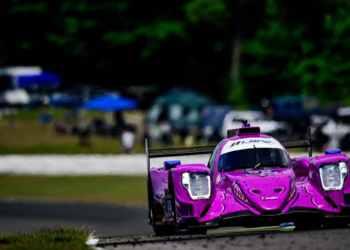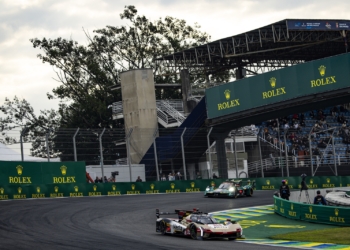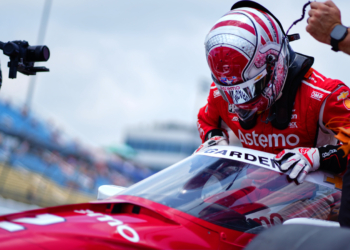I’m sure you’ll agree that it’s nice when something comes along that supports what you’ve been thinking, and arguing, for a fair old while.
And so it was for me in the recent 83rd Le Mans 24 Hours. The race always is majestic of course, and this year as is almost invariably the case at La Sarthe we had a worthy overall victor both in the triumphant marque, this time Porsche, as well as in the three triumphant drivers.
But for those of us minded mainly of F1 there was a particular story that floated above it all, that in Nico Hulkenberg one of those triumphant drivers was a currently-competing F1 pilot. That in so doing he became the first sitting F1 driver in 24 years to win this famous race, since Johnny Herbert and Bertrand Gachot did the same for Mazda in 1991.
It struck me too that there was something highly about appropriate about the guy who did it. Hulkenberg is about the most rounded and mature of all current F1 drivers; one that seems most aware of the world that lies beyond the paddock gates. As well as a no-nonsense racer. And a bloody quick one.
While Hulkenberg’s Force India boss Vijay Mallya whatever else you think of him deserves immense credit also for defying conventional F1 team principal wisdom and allowing his charge to do this. Perhaps that Mallya has a long previous of being a motorsport enthusiast, as well as was once a competing driver himself, are not coincidental either.
But that this was noteworthy for its extreme rarity, to the point that Hulkenberg being permitted by his F1 employer to take part at all let alone winning seemed something from wild and wacky leftfield, is in itself sad. As time was active F1 drivers taking part in other motorsport categories in addition to their Grands Prix duties was absolutely routine. And to get around to the hobby horse of mine that I touched upon at the outset what I really hope is that this all opens a few more minds to the prospect of contemporary F1 drivers taking part in other motorsport series.
Perhaps to the modern ear such a thing sounds outlandish but there is no grand departure here. As stated if we do get more of this then motorsport will simply be going back to the future. There was a time that an F1 driver would do the widest variety of other events in addition, even over and above the non-championship rounds that used to be common also. Sports cars, F2 and plenty of other things besides – from the sublime to sometimes the ridiculous. The likes of Stirling Moss, Mario Andretti and Jim Clark to name but three were considered a master of most of them.

Nico Hulkenberg following his Le Mans victory © Michel JAMIN (ACO)
To give one extreme example from Clark’s case as outlined in a previous column this year is the fiftieth anniversary of his astonishing 1965. And in those 12 months over and above the F1 Grandes Epreuves and several non-championship and auxiliary F1 events he excelled in Formula 2, entered the year as the British Saloon Car (the forerunner of the BTCC) champion and in 1965 won two rounds in addition to another saloon car event, he also was superb in sports car races. Then there was the not-small matter of the Indianapolis 500, which he just so happened to win. In 1966 he took part in the RAC Rally too.
As for why this was the practice, the onus was mainly financial in this pre Bernie-driven commercial age; most of what money there was for drivers and teams came from start and finish prize money. In a striking illustration Chris Amon for one in his 1967 Ferrari deal had a salary of (even allowing for inflation) a mere $1,000 a month which covered him driving not just in F1 but sports cars, Can-Am and the Tasman Series also. Yet more pointedly in addition to his retainer he got 50% of the prize money he gathered. It therefore made sense for both driver and marque to squeeze in as many races in as many categories as possible.
But matters turned as F1’s commercialism grew from the early 1970s. Salaries of course grew at the same time – along with the attendant sense that drivers were precious ‘investments’ – as did sponsor commitments and the like as well as the potential for conflicts between those in F1 and those in the other categories. Also on the rise was the time required for testing. Therefore the time, opportunity and necessity for F1 drivers to do other things declined in unison.
As the 1980s progressed Le Mans itself in so far as active F1 drivers got involved became more and more an activity for midfielders and tail-enders. Come the mid-1990s it died out almost altogether after Gachot took part in the 1995 race. The more recent examples of Franck Montagny participating in 2006 and Sebastien Bourdais in 2009 (both finishing second) were very much isolated.
But since severe testing restrictions were introduced in F1 for that same 2009 year even though there suddenly seemed a lot less stopping such diversification it didn’t really happen in the short term. Barriers arising from conflicting sponsor and manufacturer commitments didn’t help but the main impediment was the fear among employers that their driving investments would hurt themselves. F1 drivers’ contracts had long since tended to be specific about not doing other series.
We also had the case of Robert Kubica, which was not only sad in itself but was additionally so with the impact it seemed to have on the debate over what else F1 drivers do.
Nigel Roebuck took up the story at the time: “In many respects, Kubica is a Grand Prix driver out of his time. One can easily picture him in the 1960s or ’70s, relishing the (real) Nurburgring, driving F1 cars one weekend, F2 the next, sports cars after that. What I’m saying is that Robert personifies ‘racer’. No creature of the PR age, he finds himself in the profession of which he dreamed – sometimes hopelessly – through childhood in Poland, and the only part of it that matters a damn to him is the driving. In that respect, he reminds one more of Stirling Moss or Mario Andretti or Pedro Rodriguez than any of his contemporaries.”
Like Hulkenberg, Kubica is a straightforward and grounded guy as well as a no-nonsense racer of considerable talent. Like Hulkenberg too he was attracted by the simple prospect in his downtime of taking a machine to its limit rather than mere sitting around. Kubica also had always a passion for rallying; considered Sainz and McRae his childhood heroes rather than Senna and Prost. Yet Kubica’s extremely bright-shining F1 career was snuffed out by arm injuries sustained in a rally accident on the eve of the 2011 season.
And of course plenty were suddenly wise after the event and condemned Kubica for his recklessness, and asked whether teams should allow their drivers to take part in ‘extra-curricular’ motorsport at all. Martin Brundle for one called the Pole “crazy” for taking part in a rally between key pre-season tests. “When you look at the course and the trees and the walls and the drops and the barriers, it doesn’t make a lot of sense to me that he was out doing it” he said. “It wasn’t smart and I think his manager and his team should have reeled him in a little bit on that and just said ‘let’s not do this'”.

The winning #19 Porsche during a late-night stint © Michel JAMIN (ACO)
Kubica’s then-Renault boss Eric Boullier countered by stating that he did not want “a corporate driver – a robot” as well as that – understanding the sort of chap that Kubica is – he felt that putting the shackles on his star would have achieved little for his contentment and motivation. But despite this the issue of F1 drivers doing other series for a time returned to base camp.
But then as now the general ‘wrap them in cotton wool’ argument struck me as silly, in that you can hurt yourself in many activities. Plenty of drivers ski; Jenson Button likes his triathlons; Fernando Alonso is photographed frequently on his mountain bike. No one to my knowledge criticises them for it. Yet is it not possible that they could hurt themselves falling off? Put themselves out of a few races or worse? Would it have made the critics feel better if Kubica had sustained his injury in a road car? Heck, you can hurt yourself getting out of the bath. I could even tell you the story of the Spanish goalkeeper Santiago Canizares who lost his place in the national team due to an injury sustained from dropping an aftershave bottle on his foot… In other words, stuff happens.
This hobby horse of F1 drivers doing other series isn’t just based on nostalgia either. The benefits of it are plenty. Not least to the F1 drivers themselves. If nothing else they expand their experience and repertoire. They also get the ‘racer’ kudos that Roebuck outlined. And if they do well of course they gain a lot in reputation.
In Hulkenberg’s specific case, a man with a junior formulae record like a dream and for various reasons absurdly and repeatedly shunned for top-line F1 opportunities, in his Le Mans performance and victory he gave all a stark reminder of his ability. Not for nothing the Hulk’s stepping into the Red Bull Ring paddock for the Austrian Grand Prix a few days later was as one of a conquering hero. Whether it’s enough to precipitate his long-overdue move to a team at the front remains to be seen; we might say it’s unlikely even so. But still it at least won’t have done any harm to bring renewed attention to how silly his being overlooked for years has been. It seems timely too as the creeping suspicion in recent months was that those deciding on the sport’s most sought seats were feeling that the Hulk’s time was passing.
His Force India team too has achieved plenty of reflected glory as well as positive publicity for its open-mindedness as mentioned.
The benefits are not confined to F1 either. It stands to reason that the more top-level drivers take part in an event the more focus it’ll get; the more esteem it’ll be held in. And without wishing to sound chauvinistic surely most other categories will welcome F1 drivers taking part on these grounds.
Again we can use history as our guide. For all that Le Mans is healthy now many historians of the race consider the 1960s its real heyday, as among other reasons then it attracted entries that read like a who’s who of contemporary motorsport. The legendary scribe Jabby Crombac reckoned the 1967 Le Mans was the finest in its long history indeed. And it’s easy to understand why he felt that way, as Roebuck takes up this story too: “In Fords were Gurney/Foyt, McLaren/Donohue, Andretti/Bianchi, Hulme/Ruby, Bucknum/Hawkins, Gardner/McCluskey, Schlesser/Ligier and Redman/Salmon. Ferrari had factory cars for Amon/Vaccarella, Parkes/Scarfiotti and Klass/Sutcliffe, with privately entered examples for Mairesse/Teurlys, Attwood/Courage, Rodriguez/Baghetti and Guichet/Muller.”
“There were two of the high-winged Chaparral 2Fs, one of them driven by P Hill/Spence, and a pair of Lola-Aston Martin T70s, one crewed by Surtees/Hobbs. A couple of JW Automotive Mirages were handled by Ickx/Muir and Piper/Thompson, and there were factory Porsches for Siffert/Herrmann, Rindt/Mitter, Stommelen/Neerpasch and Elford/Pon. In Matras were Beltoise/Servoz-Gavin and Jaussaud/Pescarolo, and in the Alpine Larrousse/Depailler. Virtually every world-class driver on the planet was at La Sarthe that weekend…”
Of course there may be flipsides, most obviously that the more F1 drivers do other things almost by definition the fewer slots and therefore opportunities there will be for others. But even if this is the case those non-F1 drivers still there will have a much stronger opportunity to showcase themselves, given the greater attention as a result as well as the greater reputations of those that they are up against. To use history as our guide again a lot of the reason everyone in the mid-to-late 1960s knew that Jochen Rindt could do the business against anyone even after years of picking the wrong F1 cars was that in F2 he was taking on and beating a lot of those at the F1 sharp end consistently. Eventually he landed the plum F1 drive of a Lotus. And presumably if the series is healthier it’ll have larger grids anyway.
Even F1 itself gains, given its drivers are shown to be versatile and talented. As Daniel Ricciardo noted a few days after Hulkenberg’s Le Mans triumph: “Nico has made us all look good”. It all seems a very effective counter to the constrained and pampered image, all driving half-throttle around sanitised tracks with car parks for run-off areas, that a few of F1’s detractors may hold towards it.
As we know Fernando Alonso has considerable interest in doing Le Mans and came “very close” to getting a ride for Porsche for the race just passed – in the number 19 car that became victorious indeed – only for Honda to block it. Imagine what a story that would have been for both F1 and Le Mans for Alonso to be a Le Mans winner. He’d have been the first F1 world champion to bag a Le Mans triumph too since the sole holder of motorsport’s ‘Triple Crown’ (which includes the Indy 500) Graham Hill did it in 1972.
But the best signs are that this all has a stronger pulse than it has in a while. Of course what the Hulk has done gives it all a massive boost; in Austria’s F1 gathering following his Le Mans win in addition to Alonso’s well-established interest (and Jenson Button has in the recent past expressed an interest in Le Mans too) a few more – including Sebastian Vettel and Daniel Ricciardo – were casting eager eyes over the race also. Ricciardo indeed expressed hope that Hulkenberg would be a trail-blazer: “Racing is what we do…and it all seems possible for us now. So, maybe we’ll get the praise from our teams to venture into these things for the future” he said.
Now it’s over to F1 team principals to take Mallya’s lead and not stand in the way of such things. No one’s ever got rich second guessing that often rather strange bunch but even for them the logic and the momentum may be hard to halt. We have strong grounds to hope that the biggest win from Nico Hulkenberg’s recent Le Mans effort yet awaits us.






